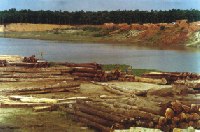|
Environment
A deep connection with the land
Kavita Charanji
Social forestry is a sugar coat for plantation," says environmental activist and prolific writer, Philip Gain. As director of the Society for Environment and Human Development (SEHD), Gain has the authority for this comment because he has spent the last two decades traversing through the length and breadth of the country in the course of his investigation into environmental and human rights issues.

An Activist for Nature |
Gain points to the destruction of the environment through the misguided policies of international financial institutions such as the World Bank and Asian Development Bank as well as the government. Citing case studies from a brochure, titled Cry of the Forest--The forest and Her Children-Images of Pain he shows the stark reality of denuded forests in Bangladesh. There's a photograph of a sal forest in Modhupur laid bare by the plantation of the invasive species of acacia. Though most of the forest was covered with sal species some decades ago, today it has been rendered barren or replaced by commercial plantations. Environmentalists, such as Gain, are of the opinion that the acacia, an exotic species, is less suitable for the forest and the indigenous people in the forest. Moreover the description of sal forests as slow growing, depleted, irregular or less productive, is questionable.
The end result of felling sal trees in Modhupur in the name of social forestry has its share of critics. According to Gain, acacia plantation amounts to monoculture. In his words, " Traditional sal forest has now become history. After the introduction of commercial monoculture of rubber, eucalyptus, acacia and other exotic varieties, the shoots of sal trees have been clear cut in areas where regeneration could take place with minimum expenses."
In addition to these exotic varieties, plantations with species fitted for pulpwood production are being developed in Chittagong and Chittagong Hill Tract regions, Sylhet and sal forest regions. These plantations are to feed the Karnaphuli paper mills and the new pulp and paper mills that are coming up in Dhaka-Chittagong highway or elsewhere.
Government policies seem to be insensitive to the needs of the local people who live in these forests. In the brochure is a photograph of concrete walls with barbed wire on top to protect the remaining sal trees in Modhupur. This drastic step has aroused the ire of the indigenous communities who have lived on the forest land since time immemorial. While the Forest Department seeks to protect the forests with fences, a large part of the sal forest is under the plantation of pineapples, bananas, cassava and commercial plantation of invasive species, going against laws and environmental regulations. Fingers have been pointed against corrupt Forest Department officials.
The plantations, says Gain, have contributed to human rights abuses and social unrest in the area. As he puts it, "Plantations disguised as social forestry have caused ecological disaster and immense human suffering."
There is, however, a glimmer of hope on the horizon, says Gain. Tracing the history of popular resistance to rubber plantations in the 1980s, one sees the strong opposition of local communities to such plantations. The Coordinating Council for Human Rights in Bangladesh (CCHRB) with Father RW Timm as its president and Gain as its then director responded to the plea of the locals. Gain used the power of the pen to generate public awareness and bring the burning issue to the notice of policy makers. His strategy was to write a series of reports on the atrocities in the rubber plantations. The written works questioned the rationale behind government-sponsored and foreign-funded rubber plantation, which led to the devastation of thousands of acres of sal forest.
The media reports had a ripple effect on the policy makers and the ADB Bank, preparing to provide a big loan for rubber plantation, had to withdraw by 1990. Despite this small victory, there was little cause for celebration because the government and ADB did not give up. Commercial plantation, funded by the ADB and implemented by the Forest Department, was begun almost simultaneously.

Sal cleared and furnt for plaintation in Modhupur
In addition to such campaigns, SEHD is engaged in other fields. For one, the organisation carries on research on human rights and environment. Then there are its reputed publications such as The Last Forests of Bangladesh, The CCHRB Election Observation Report--The Eighth Parliamentary Elections 2002 and Handbook on Election Reporting. Gain has done about 100 reports on forestry issues and 50 on destruction of sal forest areas in Modhupur. Another tool to raise public awareness is two documentary films, Mandi (on the destruction of the Modhupur forest and forest people) and Chokoria Sundarban: Je Bone Gachh Nei, which homes in on the destruction of the Chokoria mangrove through shrimp cultivation. Gain is now in the process of making a new film on plantations on public forest land. As he says, "The key words that we will be using in the film will be plantations are not forests." The film's focus is on plantations in Modhupur but it also covers Chittagong and Chittagong Hill Tracts. and other plantations. The film will be completed in the next couple of months.
SEHD, under Gain, also conducts investigations into human rights and environmental problems. Says Gain, "One achievement is that we have opened new frontiers for the media. We have trained over 600 journalists in human rights, environment, forestry and documentation. We are very happy with the response. One case in point is our Handbook on Election Reporting which has become a tool for journalists and election monitors."
 Going back in time, he says, "I always had a deep connection with the land. My father was a farmer and I used to help him in his work. My mother never went to school." Born in the village of Goplaganj, at the age of 15 Gain went to Khulna where he studied at St Joseph's High School. Then followed studies at Notre Dame College, Dhaka where he did his higher secondary and BA. Finally, he did his MA in 1987 Going back in time, he says, "I always had a deep connection with the land. My father was a farmer and I used to help him in his work. My mother never went to school." Born in the village of Goplaganj, at the age of 15 Gain went to Khulna where he studied at St Joseph's High School. Then followed studies at Notre Dame College, Dhaka where he did his higher secondary and BA. Finally, he did his MA in 1987
His professional experience began part time with Hotline Bangladesh, a Hong Kong-based human rights organisation. Between 1988 and 1992 he worked as director with the CCHRB and finally he took on his present persona with SEHD in 1993.
Gain is a strong adherent of what he calls systems thinking. His explanation, "The best example of this thinking is a football match. In a team of players if everyone plays right you have a chance to win. Then if you think together you can act together."
His goal, says Gain is to see an improvement in the human rights situation for the marginalised people. This translates into increased political protection of the indigenous people, political participation of the people, empowerment of women, participation of indigenous people in development processes. "Our purpose is to facilitate the free flow of information so that people make the right choices about their lives," he says
Gain's path breakingwork has won him much acclaim. He is the recipient of the Ashoka Fellowship award in 1989 for three years, Alfred Friendly Press Fellowship (US) in 1993. He was also honoured as a Yale World Fellow (US) in 2002.
What's next on the agenda? Gain says that SEHD is under pressure to conduct and publish new research. The organisation is now working on profiles of all ethnic communities, write-ups on many other aspects of ethnic communities and other issues. There are also a number of policy critiques regarding tea workers, ethnic communities. Right now he is editing a handbook for the general reporters in Bangla. This is on how to report and do features on environment, human rights and women's issues.
Copyright
(R) thedailystar.net 2005
|
